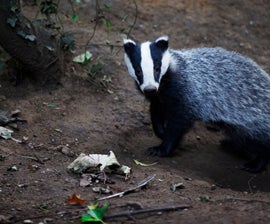-

Badger are under threat in England. Stuart Matthews
It’s not only badgers that are at risk from the UK government’s policy of killing the animals across large areas of countryside, in its misguided attempt to control TB in cattle.
Badgers are key members of the ecosystems they inhabit. Indeed they are among the top predators in those systems, and science tells us that when you intervene with such animals, the consequences for other species are hard to predict but can be far-reaching and devastating.
When making plans to wipe out wild animals on such a large scale, the government is committed under UK and EU law and by international agreement to look into the potential effects on other animal and plant species, particularly those that are already rare or threatened, and to take measures to limit those effects.
Bern Convention
HSI believes the UK government hasn’t done nearly enough in this regard, and as such is in breach of it’s commitments under the Convention on the Conservation of European Wildlife and Natural Habitats (better known as the Bern Convention). The UK has been a signatory to the Convention, which recognises badgers as a species worthy of protection among many others, since the early 1980s.
2014
So in June 2014 HSI/UK, together with the Badger Trust and Care for the Wild International, lodged a complaint with the Bern Secretariat on the grounds that the badger cull breaches the Bern Convention because:
- It could have a negative impact on a huge range of other protected species such as ground-nesting and song birds and small mammals, caused by the removal of badgers and the subsequent knock on effects within the ecosystem, and
- It is in any event unnecessary since bovine TB can be controlled in cattle without resorting to badger culls.
The cull zones and surrounding areas are home to many protected endangered species of birds and mammals, and habitats such as heathlands, grasslands, meadows and forests. Removing or displacing large numbers of badgers from nature’s delicate balance could be catastrophic for some of these species and habitats. We are therefore asking Bern to intervene and protect all of our wildlife from this disastrous cull.
2012
HSI/UK previously lodged a complaint to the Bern Convention in February 2012, on the following grounds:
- The government cannot demonstrate that its policy will not seriously disturb badger populations;
- The government has not given sufficient consideration to alternative methods of controlling TB in cattle, in particular the development and use of vaccines in both badgers and cattle, and the instigation and enforcement of policies to reduce disease transmission between cattle;
- The reduction in cattle TB cases that the government predicts might result from its policy is nowhere near enough to justify the killing of up to 130,000 badgers, and the impacts on badger populations and the suffering of individual badgers that will ensue.
Our complaint was first considered by the Convention at its Bureau meeting in April 2012. It was deferred to its September meeting for further discussion and the Bureau requested DEFRA to respond to the issues raised. It was rejected at that September meeting without the full Bern Standing Committee ever being given the opportunity to consider this important issue, although the Convention only ever explained its decision in respect of the first ground for complaint, and never addressed the other two.
